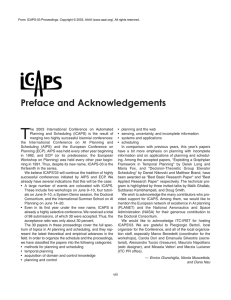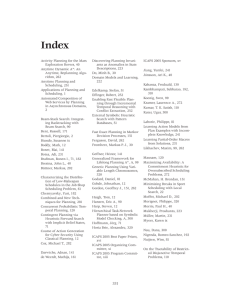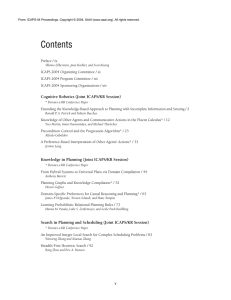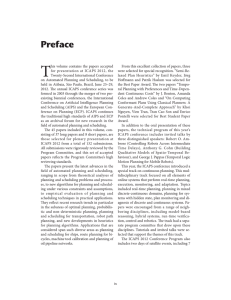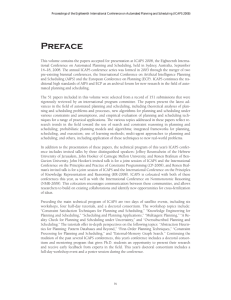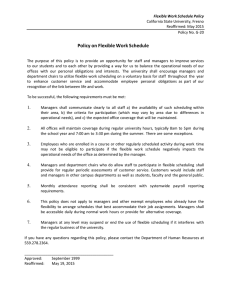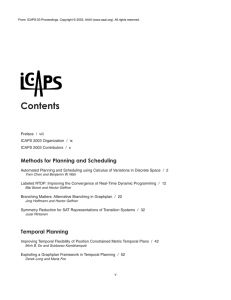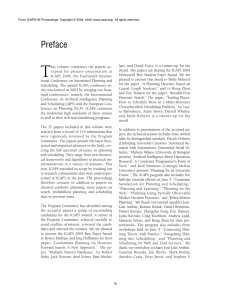Document 13908376
advertisement
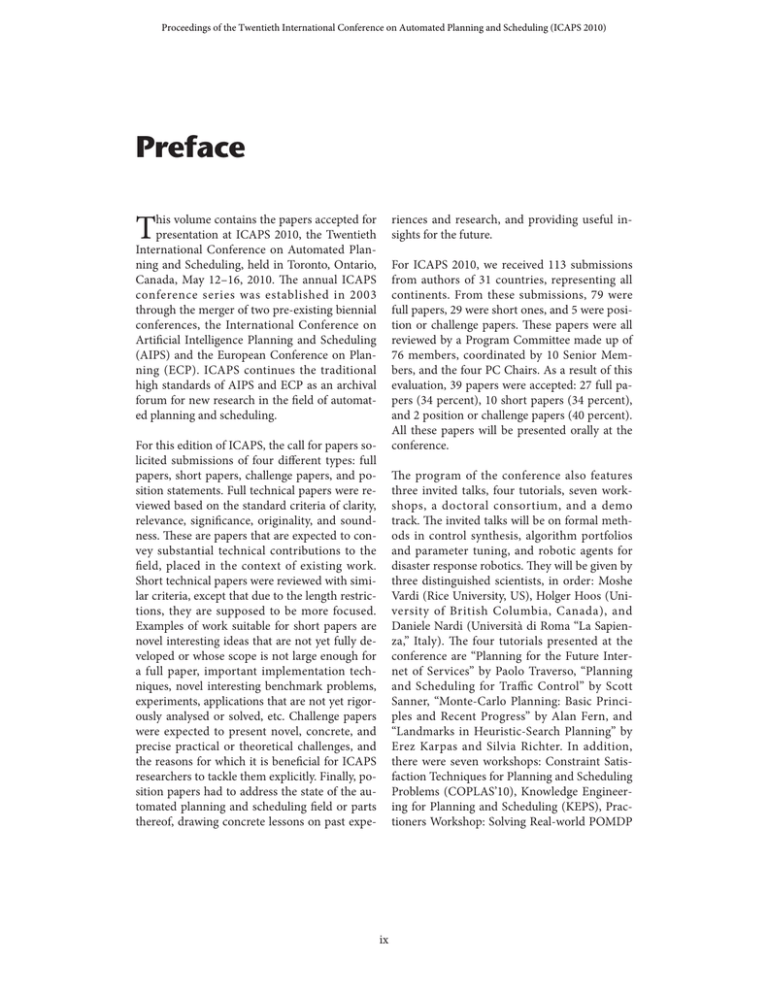
Proceedings of the Twentieth International Conference on Automated Planning and Scheduling (ICAPS 2010) Preface his volume contains the papers accepted for presentation at ICAPS 2010, the Twentieth International Conference on Automated Planning and Scheduling, held in Toronto, Ontario, Canada, May 12–16, 2010. The annual ICAPS conference series was established in 2003 through the merger of two pre-existing biennial conferences, the International Conference on Artificial Intelligence Planning and Scheduling (AIPS) and the European Conference on Planning (ECP). ICAPS continues the traditional high standards of AIPS and ECP as an archival forum for new research in the field of automated planning and scheduling. riences and research, and providing useful insights for the future. T For ICAPS 2010, we received 113 submissions from authors of 31 countries, representing all continents. From these submissions, 79 were full papers, 29 were short ones, and 5 were position or challenge papers. These papers were all reviewed by a Program Committee made up of 76 members, coordinated by 10 Senior Members, and the four PC Chairs. As a result of this evaluation, 39 papers were accepted: 27 full papers (34 percent), 10 short papers (34 percent), and 2 position or challenge papers (40 percent). All these papers will be presented orally at the conference. For this edition of ICAPS, the call for papers solicited submissions of four different types: full papers, short papers, challenge papers, and position statements. Full technical papers were reviewed based on the standard criteria of clarity, relevance, significance, originality, and soundness. These are papers that are expected to convey substantial technical contributions to the field, placed in the context of existing work. Short technical papers were reviewed with similar criteria, except that due to the length restrictions, they are supposed to be more focused. Examples of work suitable for short papers are novel interesting ideas that are not yet fully developed or whose scope is not large enough for a full paper, important implementation techniques, novel interesting benchmark problems, experiments, applications that are not yet rigorously analysed or solved, etc. Challenge papers were expected to present novel, concrete, and precise practical or theoretical challenges, and the reasons for which it is beneficial for ICAPS researchers to tackle them explicitly. Finally, position papers had to address the state of the automated planning and scheduling field or parts thereof, drawing concrete lessons on past expe- The program of the conference also features three invited talks, four tutorials, seven workshops, a doctoral consortium, and a demo track. The invited talks will be on formal methods in control synthesis, algorithm portfolios and parameter tuning, and robotic agents for disaster response robotics. They will be given by three distinguished scientists, in order: Moshe Vardi (Rice University, US), Holger Hoos (University of British Columbia, Canada), and Daniele Nardi (Università di Roma “La Sapienza,” Italy). The four tutorials presented at the conference are “Planning for the Future Internet of Services” by Paolo Traverso, “Planning and Scheduling for Traffic Control” by Scott Sanner, “Monte-Carlo Planning: Basic Principles and Recent Progress” by Alan Fern, and “Landmarks in Heuristic-Search Planning” by Erez Karpas and Silvia Richter. In addition, there were seven workshops: Constraint Satisfaction Techniques for Planning and Scheduling Problems (COPLAS’10), Knowledge Engineering for Planning and Scheduling (KEPS), Practioners Workshop: Solving Real-world POMDP ix Finally, we thank the ICAPS council, who trusted us to organize ICAPS-2010, and most importantly, the planning and scheduling community who supported this event by submitting their work and participating actively in it. Problems (POMDP), Scheduling and Planning Applications (SPARK), Planning in Games, Planning and Scheduling Under Uncertainty, and Combining Action and Motion Planning (CAMP). ICAPS 2010 will be colocated with the Conference on Autonomous Agents and Multiagent Systems (AAMAS), the International Conference on Formal Ontology in Information Systems (FOIS), the Conference on the Principles of Knowledge Representation and Reasoning (KR), and the International Workshops on Non-Monotonic Reasoning (NMR). – Ronen Brafman, Héctor Geffner, Jörg Hoffmann, Henry Kautz ICAPS-2010 Chairs We thank all members of the Program Committee for their effort in the review process that is critical for maintaining the level of the conference. We also thank the researchers involved in the various aspects of the organization of ICAPS 2010: Mark Boddy and Maria Fox (Sponsorship Chairs), Jorge Baier (Local Organization Chair), Alexandre Albore, Adi Botea, and Nir Lipovetzky (Publicity Chairs), Stephen Smith (Workshop Chair), Carmel Domshlak (Tutorial Chair), Ivan Serina and Neil YorkeSmith (Demo Chairs), and Daniel Bryce and Scott Sanner (Doctoral Consortium Chairs). x
